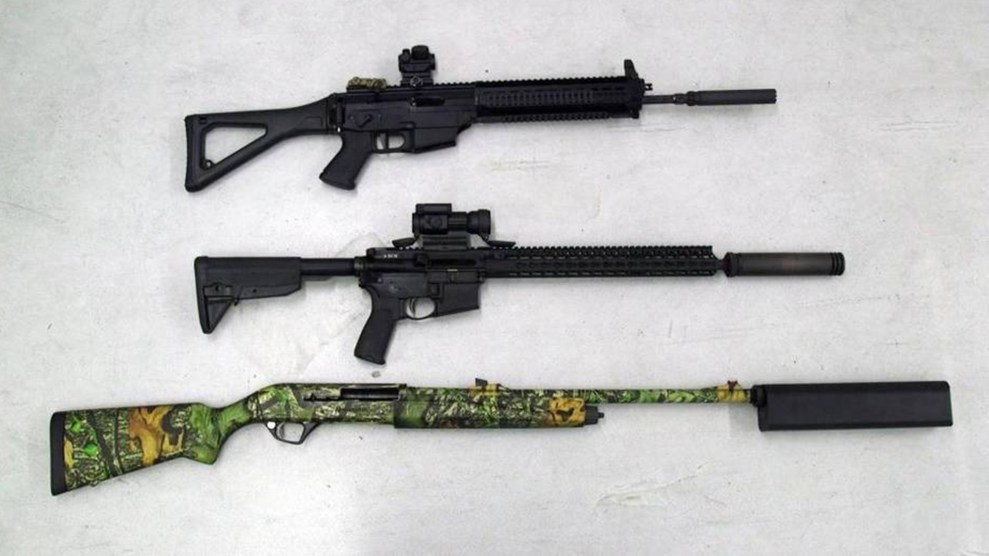
Ali Rizvi/ZUMA
As I reported for Mother Jones two weeks ago, Republicans in Congress have been quietly advancing a bill that would deregulate gun silencers, removing them from the list of weapons and accessories heavily regulated by the National Firearms Act of 1934. Dubbed the Hearing Protection Act when first introduced in January, the legislation was folded this summer into the Sportsmen’s Heritage and Recreational Enhancement Act (SHARE Act) by House Republicans—in an effort to help it fly under the radar as part of that bipartisan and typically easy-to-pass bill. But following the mass shooting in Las Vegas on Sunday night that claimed at least 58 lives and left more than 500 injured, the legislation has been thrust into the spotlight.
“The crowd fled at the sound of gunshots,” tweeted Hillary Clinton. “Imagine the deaths if the shooter had a silencer, which the NRA wants to make easier to get.”
It is unclear how the issue might have mattered in the Las Vegas attack, whose heavily armed perpetrator reportedly used “fully automatic” weapons. But in general, law enforcement experts say that deregulating silencers could have “devastating effects” on public safety and the safety of law enforcement officers.
As I reported recently, here’s what the legislation would do:
The bill—co-sponsored by Rep. Mo Brooks (R-AL), who narrowly missed getting shot in June when a gunman attacked a congressional baseball practice—would make the purchase of a silencer subject only to an instant background check, or potentially to no regulation at all in states that don’t require background checks for gun sales in private, at gun shows and online…
Silencers currently are legally obtainable after submitting an application, passing a background check, submitting fingerprints, paying a $200 fee, and registering the silencer with the Bureau of Alcohol, Tobacco, and Firearms (ATF). Because paperwork must be filed with the overburdened and underfunded agency, wait times can be months-long. The Hearing Protection Act—which House Republicans in June folded into the Sportsmen’s Heritage and Recreational Enhancement Act (SHARE Act), a bi-partisan package that typically passes with little drama—would do away with these hurdles.
The bill was pushed early and hard by the gun industry. SilencerCo, the largest silencer manufacturer in the country, led a high-profile campaign that hyped the likelihood of HPA’s imminent passage and published a 38-minute interview with Donald Trump Jr., which ended with Trump Jr. saying that if the legislation made its way through Congress, his father is “obviously gonna be for it.”
Proponents of the bill argue that deregulating silencers is in the interest of public safety—silencers protect the hearing of sport shooters who suffer from the din of firearms, they say:
Silencers “reduce the damage that gunshots do to the shooter in terms of their hearing, and reduce the overall noise impact for everyone,” says Todd Rathner, a gun rights lobbyist and executive director of the NFA Freedom Alliance, which campaigns to roll back restrictions on items regulated by the National Firearms Act. “If firearm sound suppressors were treated the way lawnmowers and chainsaws were treated, they would be required on firearms,” Rathner says, adding that opposition to the gear is “a cynical, knee-jerk political reaction, not one based on knowledge or experience.”
But according to a recent memo from the Law Enforcement Coalition for Common Sense, signed by more than a dozen current and former law enforcement leaders. “Silencers mask the sound of a gun, changing the sound into one not easily recognized as gunfire,” the memo says. “As a result, assassination-style murders become easier, and bystanders may not know to alert first responders…This proposal would pose an additional threat to law enforcement at a time where officer safety is already at increased risk.”














